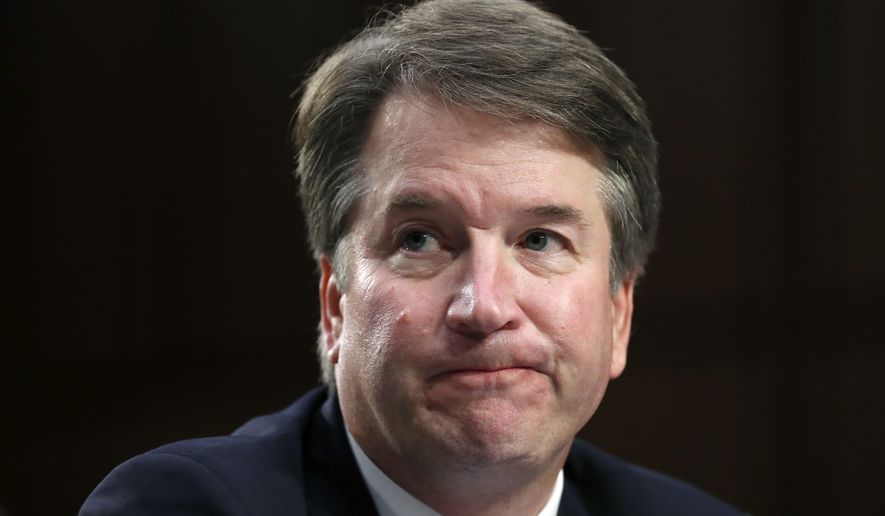Senators hope to get a chance next week to hear personally from both Judge Brett M. Kavanaugh and his accuser, but even then experts predict they will struggle to cut through the he-said-she-said nature of the sexual assault allegation.
Sorting out the gap between Christine Blasey Ford’s recollection of the events at a party more than 30 years ago and Judge Kavanaugh’s flat rejection of her accusation would be tough in any circumstance.
But Ms. Ford’s hazy memory of some details, the way Democrats sprung the allegations late in the confirmation process, the nature of a congressional hearing and the high stakes involved — a seat on the Supreme Court — make it all the less likely that senators will be able to resolve the matter beyond a reasonable doubt.
“This is just the worst possible venue to determine the truth because we have no real ability to sift the evidence and stories,” said K.C. Johnson, a history professor at Brooklyn College who investigated the false accusations leveled against Duke lacrosse players in 2006. “Now it’s just a he-said-she-said thing, and the opportunity to go back and forth to the various parties, if this had been a confidential investigation by committee counsels, has been lost.”
Ms. Ford says she remembers Judge Kavanaugh, as a 17-year-old student at all-boys Catholic school Georgetown Prep, pulling her into a room at a house party. He tore at her clothes and bathing suit and stifled her yell for help before an equally inebriated friend jumped onto the two and she escaped.
Judge Kavanaugh insists no such incident occurred, with Ms. Ford or anyone else. His friend, Mark Judge, who Ms. Ford says broke up the incident, also has denied Ms. Ford’s account.
SEE ALSO: Republicans on Senate panel ready to vote if Christine Blasey Ford doesn’t testify
After suggesting that each party should talk privately with Senate investigators, Republican leaders agreed to stage a hearing Monday and asked both Ms. Ford and Judge Kavanaugh to testify.
“Both accuser and accused should be treated with great courtesy and respect because one of them is probably telling the truth, but also should have his or her credibility probed through strong cross-examination and other truth-finding tools because one of them is probably lying,” said Stuart Taylor Jr., an author and legal analyst associated with the Brookings Institution.
Those who work with survivors of sexual assault and some criminal justice analysts say the fact that Ms. Ford’s explosive assertions did not surface until more than 35 years after the alleged incident and just before the Senate Judiciary Committee was scheduled to vote on Judge Kavanaugh’s nomination should not cast her story in a negative light.
“History tells us that hearing allegations such as these often leads others to reach out for help,” said Jodi Omear, communications vice president for the Rape, Abuse and Incest National Network.
Both sides have character witnesses who, while having no knowledge of the specific night in the 1980s, are offering their thoughts nonetheless.
In Judge Kavanaugh’s corner, 65 women signed a letter saying they knew him from those days and can’t fathom his involvement in any such behavior.
For Ms. Ford, several hundred women who attended her private high school, Holton-Arms, and who say her description is “all too consistent with stories we heard and lived” have signed another letter.
Given the long time span since the alleged incident, senators and the public must rely on their assessment of each character’s version rather than hard evidence.
“There’s no question that victims often don’t like to talk about this until much later,” said Lawrence Kobilinsky, a professor and forensic science specialist at John Jay College of Criminal Justice in New York. “The issue, of course, is how reliable and accurate her account is — there’s no smoking gun, no photograph — unless she retained a dress.”
If Ms. Ford were to walk into a New York police station this year and tell her story from the early 1980s, Mr. Kobilinsky said, “they’d probably tell her to get lost.”
The FBI has declined to investigate, saying no federal crime or national security matter is implicated. Local authorities in the Washington suburb of Montgomery County, Maryland, where Georgetown Prep and Holton-Arms are located, said no one has come forward to complain, so they are not investigating, either.
“But the truth is in criminal matters most of the time you’re dealing with circumstantial evidence,” Mr. Kobilinsky said. “So we have a he-said-she-said situation that boils down to nothing, and if this really did happen, that’s a shame.”
Mr. Kobilinsky pointed to the polygraph test Ms. Ford’s attorney said she passed and the notes from a therapist taken in 2012 that do not name Kavanaugh but mention the incident, as the sort of circumstantial evidence a court may consider.
Of course, it’s also a shame if it didn’t happen, Mr. Johnson said.
The situation unfolding may work to the advantage of Sen. Dianne Feinstein, the California Democrat who allowed Ms. Ford’s accusatory letter to leak months after she received it, and those who want to derail Judge Kavanaugh’s appointment, but it is the “worst possible way” for accuser and defendant, the Senate, the Supreme Court and the truth, Mr. Johnson said.
“It’s a disaster to all parties,” he said. “What we’ve lost because of the way this has been handled is the chance to flesh out contradictions in versions, to go back and forth to the parties confidentially, in part because now that it’s so public it will be a one-shot deal.”
• James Varney can be reached at jvarney@washingtontimes.com.




Please read our comment policy before commenting.